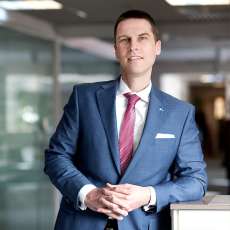The German-Romanian Chamber of Commerce (AHK) was formed in 2002 and is a bilateral organization that represents the interests of both German and Romanian companies and encourages trade and investments. It is also the official representative of the German economy, Romania’s most significant trading partner.
You represent the largest bilateral chamber in Romania, please introduce us to AHK’s presence and mission here.
Indeed AHK is present in Romania since 2002 and has a turnover of 1,8 million Euro, currently representing over 600 member companies. We are part of Germany’s wider net of global chambers, active in over 90 countries. We function based on three pillars: official representation and dialogue with the authorities; developing our member network, roughly half of which is in manufacturing; and thirdly we are a consultancy service provider, supporting companies with trade and investments activities among others.
How important is the trade and bilateral relationship between the two countries and what role does the energy industry play within in?
It is a very important and tight relationship. In 2018 we had 32.5 Billion Euro in bilateral trade, more specifically 17 Billion Euro in imports to Romania, up by 12% compared to 2017 and accounting for 20.5% of total imports. Exports to Germany amounted to 15.6 Billion Euro, 8.4% higher compared to 2017, and 23% of overall exports. Approximately 7,500 German companies are active in Romania with 255,000 direct employees as of 2016, likely more so at the moment.
In the energy industry, E.ON is the largest German player as far as energy distribution and supply is concerned, but German companies’ strength actually lies in technology and IT. Also, we have a strong focus on the renewables and energy efficiency side of the industry.
Renewables are in fact a key theme throughout our report and an area in which Romania has a wealth of natural resources to be harnessed – what is the angle of your work in this field?
We are very strong in the area of green technologies, including a dedicated team of researchers. For instance, Lisscom, a Romanian capital company using German technology from GFR has been working to modernize Cluj’s central heating system. They integrated all public buildings in the building management system (BMS), thus substantially reducing energy consumption and tackling the ever pervasive theme of improved energy efficiency. We also have classical companies such as Siemens and Bosch offering a wide range of services to the energy industry. It is also worth mentioning E.ON’s Next-E project done with the aid of EU financing, which aims to build 40 electrical charging stations for vehicles.
Furthermore, we are working to develop the waste-to-energy market, a massive problem right now in Romania, especially considering current recycling practices. Clariant and GETEC are working together on the bioethanol facility, but they also face the same challenge of recycling agricultural goods. Preliminary steps need to be taken to grow the biogas and biomass industries, and closer collaboration between the Energy and Environment Ministries is paramount in this respect, even in order to efficiently finalize the country’s national energy plan.
What are some of AHK’s more impactful projects that you are working on currently?
One key initiative we are working on is in the field of professional education. It is common knowledge that there is a shortage of skilled labor. AHK would like to instill some fresh breath into the professional education system, revitalizing the way practical and theoretical education is imparted on students. We are running projects such as “Scoala de Carte si Meserie”, “Caravana Meseriasilor” etc. and helping companies integrate themselves in the system. We feel that well skilled workers are a priority in order for Romania to remain competitive in the long run, especially considering the dominant weight that the manufacturing industry carries for the country’s economy and impending digitalization also changing the business environment.
Which do you consider to be the main challenges about operating in Romania’s regulatory and legislative environment?
Overall we need more clarity and cohesion in Romania’s legal environment, a necessary building block to build investor confidence. In the energy sector for example, there are two areas in need of revision and better legislative support. The first surrounds the “prosumer” concept, a fantastic initiative in principle but which needs a clearer, better organized implementation structure. Both in Germany and Romania we support a decentralized energy infrastructure for everyone’s greater benefit. This can open the door for new business opportunities and help Romania become more energy competitive and self-sufficient.
The green certificates framework is also a highly complicated matter, in need of reaching a stable and predictable status quo. We place our trust in the authorities and urge them to find an appropriate solution to this truly crucial matter.
What are AHK’s strategic goals for the next two to three years?
Romania is truly blessed, looking at its geostrategic location and plethora of natural resources. As long as we can improve on the country’s legislative and regulatory paradigm, instilling stability and trust, I believe the sky is the limit. AHK plans to intensify our work in green tech, with a twist – we wish to focus on sustainable city development. We need improved living standards in order to hinder migration out of Romania and believe that mobility, energy infrastructure and digitalization have a pivotal role to play. We will pursue our green energy initiatives further, and intensify also our professional education initiatives throughout the country. Finally, we wish to provide better support to Romania’s vibrant and rapidly developing start-up community and encourage their interaction with German companies.





